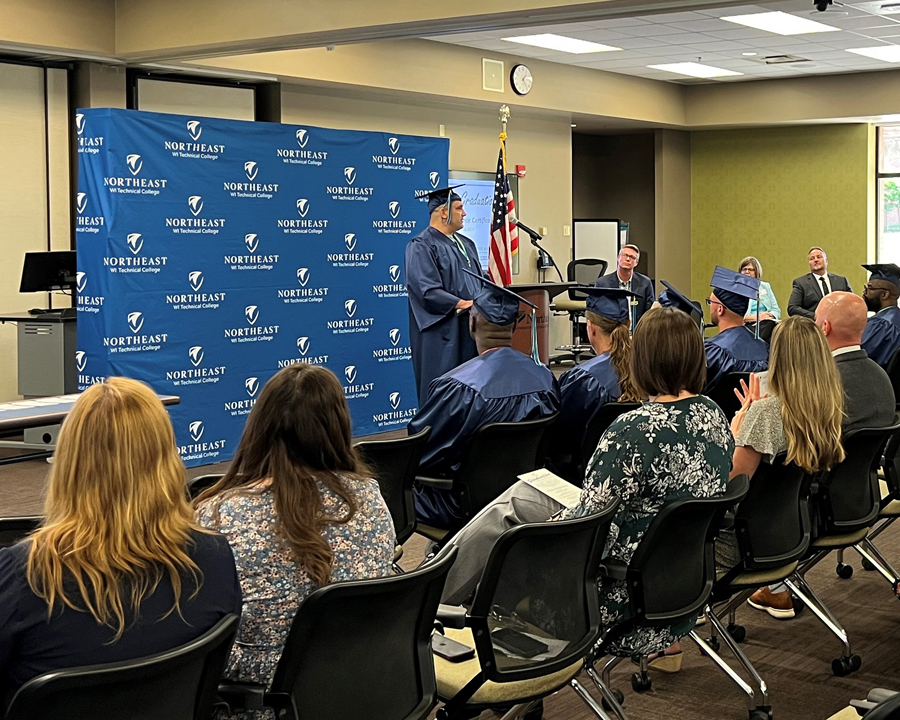
By Melanie Rossi
Contributing Writer
GREEN BAY – Incarcerated students from the Wisconsin Department of Corrections (DOC) walked across the stage and earned their college diplomas in a ceremony held Aug. 10.
The 11 students each earned a 15-credit certificate in Industrial Maintenance by completing a 15-week course through a partnership with Northeastern Wisconsin Technical College (NWTC).
Now in its fourth year, the course teaches students employable skills that can be put to use in high-demand jobs after release or through employment within the DOC.
Customized by NWTC from its usual nine-month plan into only 15 weeks, the Industrial Maintenance program allows its students to take one course a week, with around 30 hours of classroom time and training necessary to complete each course.
“Usually it takes our standard students about a full academic year to complete the certificate,” Jim Draeger, NWTC’s dean of corporate training and economic development, said. “But NWTC and the Department of Corrections, specifically with Sanger B. Powers [Correctional Center], partnered to customize this training into fifteen weeks. The DOC identifies eligible students who are soon to be released and will actually ship them from across the state to Sanger Powers to participate in this program. . . It’s quite a feat what these students have completed.”
The courses offered through the Industrial Maintenance program include classes on automation, power electronics, hydraulics, mechanical systems and safety devices, among others.
Forty-four students have already graduated from the program, with 11 earning their certificates at Thursday’s ceremony, held at NWTC’s Green Bay campus.
“What this certificate does is it prepares students upon release for an entry-level position in industrial maintenance or automation,” Draeger said. “We know that those are really high, in-demand jobs currently within manufacturing, so this certificate provides an entry point for these students to enter the workplace and reduce the chances of recidivism.”
The credits earned through the course can also be put towards completing an Electro-Mechanical Associate Degree, paving the way for students to work in other fields within the industry.
For the students, the course “provides a springboard for them to continue their personal and professional journey,” Drager said. “Oftentimes upon completion, while they’re still within the facilities, they’re going through job interviews with employers, and on day one of release they can start working right away.”
Completing an academic-year’s worth of courses in 15 weeks — and with an average GPA of 92% — the students in the program “were so determined to get this certificate,” Draeger said. “It’s all on them and their passion and their dedication to see it through to completion, and they had the resources from our quality instructors to coach them and instruct them.”
As a technical college, NWTC’s main priority is to prepare its students for the workforce.
Through this partnership with the DOC, NWTC “has a great opportunity to address the labor shortage” and meet the workforce’s immediate needs, Draeger said.
“Every employer is looking to hire employees right now, across all industries. This is a great program in which we can get a dozen folks ready in fifteen weeks to get that entry level position. So we are meeting the needs of our community and making sure that we are helping to continue to drive the economy in Northeastern Wisconsin.”
By obtaining employable skills in high-demand areas, most students who completed the course were able to find positions on work-release and become prepared for future employment after incarceration.
Granting incarcerated students “a second chance,” earning their certificates, Draeger said, “provides them a way to think long-term for the future of where they can go instead of where they can’t go.”
